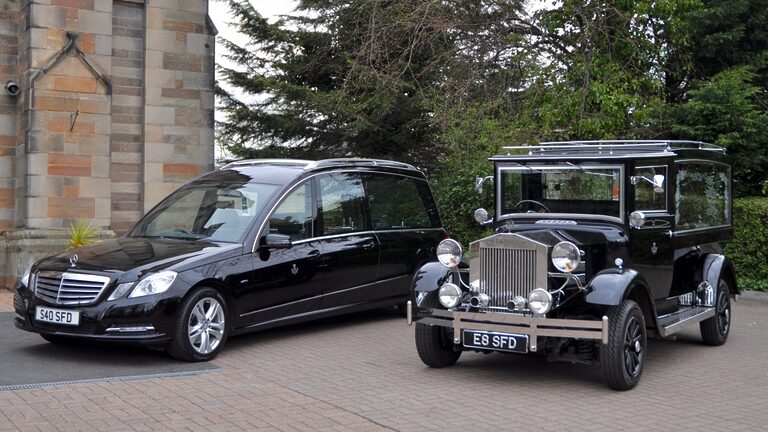How Much Does a Funeral Cost In Scotland?
Funeral costs in Scotland vary depending on the type (cremation vs burial), and what you want included. We always aim to keep our funeral costs low and transparent.
The prices below are for some of our most frequently selected packages. But remember, every funeral is unique, and while our fees are fixed by package, third party costs – things like flowers, coffins, bespoke vehicles, and newspaper notices – can vary depending on your wishes. These decisions will impact the cost of a funeral in Scotland.
Typical Cremation Cost
£4,325
Our Prices £2,999
- Professional Charges £1,309
- Bringing into our care£250
- Caring for the deceased £620
- Coffin £410
- Hearse £405
Crematorium fee £850
Third party fees £475
- Typical third party fees include flowers, officiant fee and a newspaper notices etc.
Typical Burial Cost
£4,675
Our Prices £2,999
- Professional Charges £1,309
- Bringing into our care £250
- Caring for the deceased £595
- Coffin £410
- Hearse £405
Purchase & interment £1,200
The fee for the purchase of the lair depends on the cemetery, and can range from £600 to £1,400. In addition, there may be an interment fee which can range from £500 to £1,200. A surcharge may apply if not a resident in the area.
Third party fees £475
Other Options
Simple Funeral £2,099
Direct Cremation £1,399
Children's Funerals£0.00
Funeral Costs
For a full list of services and prices please download the price lists below.

Have a question?
Simply fill in the details below and we will get back to you
View our range of coffins and how much they cost
Find out what support is available to pay for a funeral
Frequently Asked Questions
Please see below answers to some of the most frequently asked questions:
Every funeral is unique, so costs will vary depending on your wishes.
We will always provide you with an estimate for your consideration, we can then adjust this if required.
Funeral costs can be influenced by several factors, including the choice between burial and cremation, the type of coffin, transportation, the location of the service, and any additional personal touches such as flowers, music, or memorials. Many things can influence the cost of a funeral.
We’re here to support you in creating a loving and compassionate memorial for your loved one while working to meet your budget.
Yes, there are several ways to get help with funeral costs. If you are struggling with funeral expenses, you may be eligible for financial assistance through government benefits or charitable organisations.
If you require assistance towards the cost of the funeral there is a ‘Funeral Support Payment‘, this could help pay for funeral costs if you live in Scotland. It usually will not cover the full cost of the funeral but it could help pay for some costs.
Scotmid Funerals can also offer advice on managing funeral costs if no pre-arranged funeral plans are already in place.
A basic funeral with Scotmid Funerals is designed to cover the Essential services needed for a respectful and dignified service. The cost of a basic funeral typically includes the services of a funeral director, a simple coffin, and the necessary legal paperwork. For specific pricing, and funeral costs please contact our team.
If you are unable to afford the full cost of a funeral, Scotmid Funerals can work with you to find a solution. This might include selecting a more basic funeral package, exploring payment plans, or seeking external financial assistance to cover funeral costs.
A direct cremation (also known as an unattended funeral) is for those who would prefer a straightforward funeral. It’s different to a traditional funeral as there’s no funeral service and you will be unable to be present at the cremation.
If you choose our traditional funeral, then yes you will be able to choose the date and time.
You can buy one of our set cremation plans online, or you can pop into one of our offices to have a chat with one of our friendly team who will talk through all the options available.
We have 16 offices across Edinburgh and through the central belt of Scotland, and have been looking after funerals since 1927. We’re not part of the Co-op Group, who are based in Manchester. We the largest independent Co-operative in Scotland.
We’re available 24 hours a day to assist you on the telephone on 0800 996 1927. We also have 16 funeral offices which are open from 09:00 to 17:00 Monday to Friday. You can also email us at info@scotmidfunerals.coop
Latest News
Read about all the latest news from Scotmid Funerals
Don't just take our word for it
We’re proud of both the service we provide and what our clients say about it, and us. Many
of them even choose to leave 5 star reviews on our website once they’ve dealt with us,
which is incredibly generous given what they’ve recently went through.




